江苏专转本英语考试语法重点大全共26页文档
- 格式:doc
- 大小:61.50 KB
- 文档页数:25
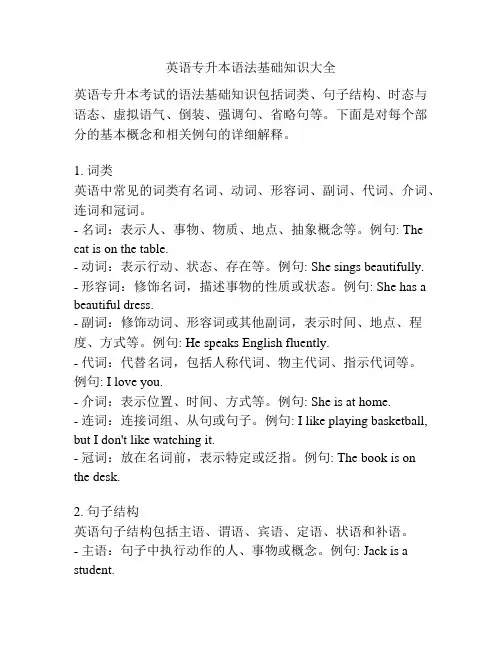
英语专升本语法基础知识大全英语专升本考试的语法基础知识包括词类、句子结构、时态与语态、虚拟语气、倒装、强调句、省略句等。
下面是对每个部分的基本概念和相关例句的详细解释。
1. 词类英语中常见的词类有名词、动词、形容词、副词、代词、介词、连词和冠词。
- 名词:表示人、事物、物质、地点、抽象概念等。
例句: The cat is on the table.- 动词:表示行动、状态、存在等。
例句: She sings beautifully. - 形容词:修饰名词,描述事物的性质或状态。
例句: She has a beautiful dress.- 副词:修饰动词、形容词或其他副词,表示时间、地点、程度、方式等。
例句: He speaks English fluently.- 代词:代替名词,包括人称代词、物主代词、指示代词等。
例句: I love you.- 介词:表示位置、时间、方式等。
例句: She is at home.- 连词:连接词组、从句或句子。
例句: I like playing basketball, but I don't like watching it.- 冠词:放在名词前,表示特定或泛指。
例句: The book is on the desk.2. 句子结构英语句子结构包括主语、谓语、宾语、定语、状语和补语。
- 主语:句子中执行动作的人、事物或概念。
例句: Jack is a student.- 谓语:句子中说明主语动作或状态的部分。
例句: The cat is sleeping.- 宾语:接受动作的对象。
例句: She bought a book.- 定语:修饰名词或代词的词组或从句。
例句: I like the blue car.- 状语:修饰动词、形容词或副词的词组或从句。
例句: He waited patiently.- 补语:用来补充说明主语或宾语的信息。
例句: She is a teacher.3. 时态与语态- 时态:表示动作或状态发生的时间。
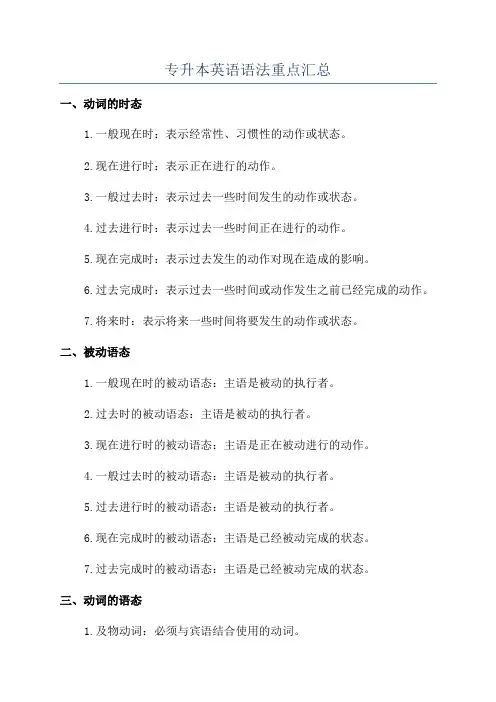
专升本英语语法重点汇总一、动词的时态1.一般现在时:表示经常性、习惯性的动作或状态。
2.现在进行时:表示正在进行的动作。
3.一般过去时:表示过去一些时间发生的动作或状态。
4.过去进行时:表示过去一些时间正在进行的动作。
5.现在完成时:表示过去发生的动作对现在造成的影响。
6.过去完成时:表示过去一些时间或动作发生之前已经完成的动作。
7.将来时:表示将来一些时间将要发生的动作或状态。
二、被动语态1.一般现在时的被动语态:主语是被动的执行者。
2.过去时的被动语态:主语是被动的执行者。
3.现在进行时的被动语态:主语是正在被动进行的动作。
4.一般过去时的被动语态:主语是被动的执行者。
5.过去进行时的被动语态:主语是被动的执行者。
6.现在完成时的被动语态:主语是已经被动完成的状态。
7.过去完成时的被动语态:主语是已经被动完成的状态。
三、动词的语态1.及物动词:必须与宾语结合使用的动词。
2.不及物动词:不需要与宾语结合使用的动词。
四、倒装句1.完全倒装:把助动词或情态动词放在主语前。
2.部分倒装:把助动词或情态动词放在谓语动词前。
五、情态动词1. can:表示能力、许可、可能。
2. could:表示过去的能力、许可、可能。
3. may:表示允许、可能。
4. might:表示过去可能。
5. must:表示推测、必须。
6. shall:表示将来的意愿。
7. should:表示建议、应该。
8. will:表示将来。
9. would:表示过去习惯、愿意。
六、名词1.可数名词:可以用来计数的名词。
2.不可数名词:不可以用来计数的名词。
3.特殊名词变复数形式。
4.特殊名词变单数形式。
七、形容词和副词1.形容词在句中的位置。
2.形容词比较级和最高级。
3.副词在句中的位置。
4.副词比较级和最高级。
五、代词1.主格代词:作为主语的代词。
2.宾格代词:作为宾语的代词。
3.物主代词:表示所属关系的代词。
4.反身代词:表示动作反过来作用于自己的代词。
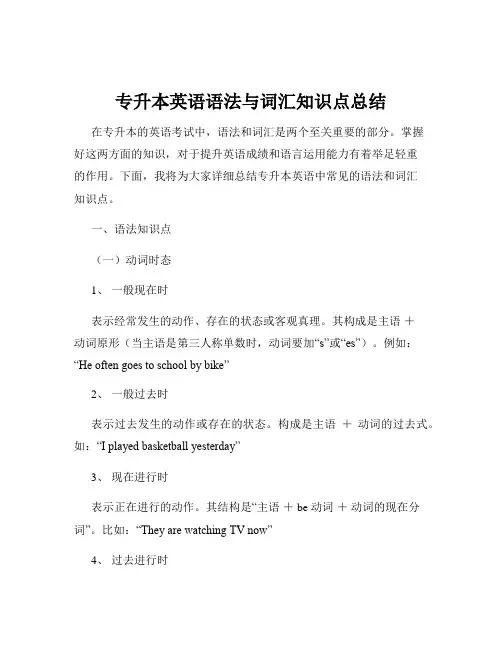
专升本英语语法与词汇知识点总结在专升本的英语考试中,语法和词汇是两个至关重要的部分。
掌握好这两方面的知识,对于提升英语成绩和语言运用能力有着举足轻重的作用。
下面,我将为大家详细总结专升本英语中常见的语法和词汇知识点。
一、语法知识点(一)动词时态1、一般现在时表示经常发生的动作、存在的状态或客观真理。
其构成是主语+动词原形(当主语是第三人称单数时,动词要加“s”或“es”)。
例如:“He often goes to school by bike”2、一般过去时表示过去发生的动作或存在的状态。
构成是主语+动词的过去式。
如:“I played basketball yesterday”3、现在进行时表示正在进行的动作。
其结构是“主语+ be 动词+动词的现在分词”。
比如:“They are watching TV now”4、过去进行时强调过去某个时间正在进行的动作,形式为“主语+ was/were +动词的现在分词”。
像:“I was reading a book at that time”5、现在完成时表示过去发生的动作对现在造成的影响或结果,或者从过去开始一直持续到现在的动作。
其构成是“主语+ have/has +过去分词”。
例如:“She has learned English for five years”6、过去完成时表示过去某个时间之前已经完成的动作,结构是“主语+ had +过去分词”。
比如:“By the end of last year, we had learned 2000 words”(二)语态1、主动语态主语是动作的执行者。
例如:“He opened the door”2、被动语态主语是动作的承受者,构成是“be +过去分词”。
如:“The door was opened by him”(三)非谓语动词1、动词不定式具有名词、形容词和副词的特征,可作主语、宾语、定语、状语等。
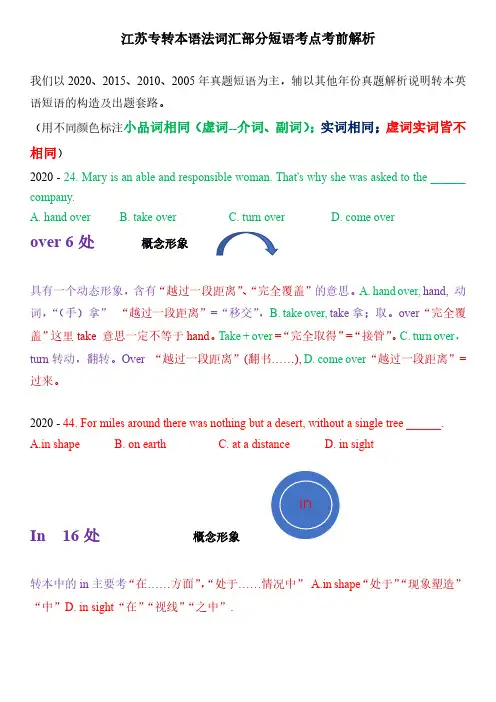
江苏专转本语法词汇部分短语考点考前解析我们以2020、2015、2010、2005年真题短语为主,辅以其他年份真题解析说明转本英语短语的构造及出题套路。
(用不同颜色标注小品词相同(虚词--介词、副词);实词相同;虚词实词皆不相同)2020 - 24. Mary is an able and responsible woman. That's why she was asked to the ______ company.A. hand overB. take overC. turn overD. come overover 6处 概念形象具有一个动态形象,含有“越过一段距离”、“完全覆盖”的意思。
A. hand over, hand, 动词,“(手)拿” “越过一段距离”=“移交”,B. take over, take 拿;取。
over “完全覆盖”这里take 意思一定不等于hand 。
Take + over =“完全取得”=“接管”。
C. turn over ,turn 转动,翻转。
Over “越过一段距离”(翻书……), D. come over “越过一段距离”=过来。
2020 - 44. For miles around there was nothing but a desert, without a single tree ______.A.in shapeB. on earthC. at a distanceD. in sightIn 16处 概念形象转本中的in 主要考“在……方面”,“处于……情况中” A.in shape “处于”“现象塑造”“中”D. in sight “在”“视线”“之中”.on 7处概念形象1概念形象2转本及考试中on有两个考点“依靠”、“持续”,由于on earth不是答案且语义固定,我们用其他年份的举例:2010- 32. The company ____many fine promises to the engineer in order to get him to work for them.A. held upB. held onC. held outD. held ontohold on “坚持不懈”,包含有“持续”意思。
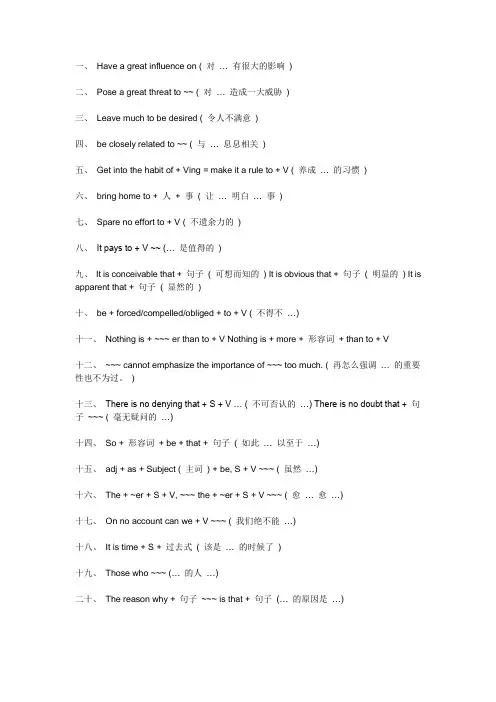
一、Have a great influence on ( 对… 有很大的影响)二、Pose a great threat to ~~ ( 对… 造成一大威胁)三、Leave much to be desired ( 令人不满意)四、be closely related to ~~ ( 与… 息息相关)五、Get into the habit of + Ving = make it a rule to + V ( 养成… 的习惯)六、bring home to + 人+ 事( 让… 明白… 事)七、Spare no effort to + V ( 不遗余力的)八、It pays to + V ~~ (… 是值得的)九、It is conceivable that + 句子( 可想而知的) It is obvious that + 句子( 明显的) It is apparent that + 句子( 显然的)十、be + forced/compelled/obliged + to + V ( 不得不…)十一、Nothing is + ~~~ er than to + V Nothing is + more + 形容词+ than to + V十二、~~~ cannot emphasize the importance of ~~~ too much. ( 再怎么强调… 的重要性也不为过。
)十三、There is no denying that + S + V … ( 不可否认的…) There is no doubt that + 句子~~~ ( 毫无疑问的…)十四、So + 形容词+ be + that + 句子( 如此… 以至于…)十五、adj + as + Subject ( 主词) + be, S + V ~~~ ( 虽然…)十六、The + ~er + S + V, ~~~ the + ~er + S + V ~~~ ( 愈… 愈…)十七、On no account can we + V ~~~ ( 我们绝不能…)十八、It is time + S + 过去式( 该是… 的时候了)十九、Those who ~~~ (… 的人…)二十、The reason why + 句子~~~ is that + 句子(… 的原因是…)。
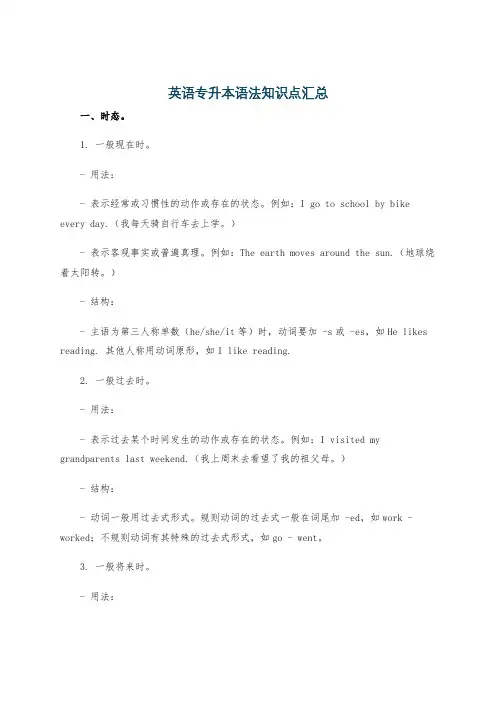
英语专升本语法知识点汇总一、时态。
1. 一般现在时。
- 用法:- 表示经常或习惯性的动作或存在的状态。
例如:I go to school by bike every day.(我每天骑自行车去上学。
)- 表示客观事实或普遍真理。
例如:The earth moves around the sun.(地球绕着太阳转。
)- 结构:- 主语为第三人称单数(he/she/it等)时,动词要加 -s或 -es,如He likes reading. 其他人称用动词原形,如I like reading.2. 一般过去时。
- 用法:- 表示过去某个时间发生的动作或存在的状态。
例如:I visited my grandparents last weekend.(我上周末去看望了我的祖父母。
)- 结构:- 动词一般用过去式形式。
规则动词的过去式一般在词尾加 -ed,如work - worked;不规则动词有其特殊的过去式形式,如go - went。
3. 一般将来时。
- 用法:- 表示将来某个时间要发生的动作或存在的状态。
例如:I will go to Beijing next month.(我下个月将去北京。
)- 结构:- 常见的结构有will+动词原形,be going to+动词原形(表示计划、打算做某事或有迹象表明即将发生某事)。
如He is going to have a party tonight.(他今晚打算举办一个聚会。
)4. 现在进行时。
- 用法:- 表示现在正在进行的动作或存在的状态。
例如:She is reading a book now.(她现在正在读一本书。
)- 结构:- be动词(am/is/are)+动词的 -ing形式。
5. 过去进行时。
- 用法:- 表示过去某个时刻或某段时间正在进行的动作。
例如:I was watching TV at 8 o'clock last night.(昨晚8点我正在看电视。
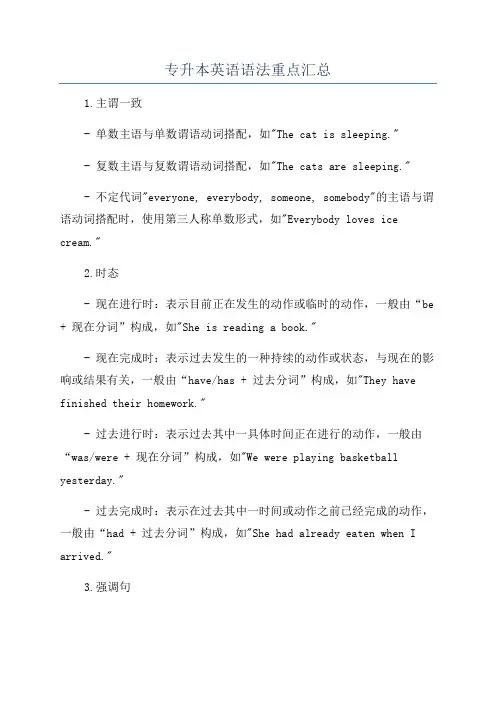
专升本英语语法重点汇总1.主谓一致- 单数主语与单数谓语动词搭配,如"The cat is sleeping."- 复数主语与复数谓语动词搭配,如"The cats are sleeping."- 不定代词"everyone, everybody, someone, somebody"的主语与谓语动词搭配时,使用第三人称单数形式,如"Everybody loves ice cream."2.时态- 现在进行时:表示目前正在发生的动作或临时的动作,一般由“be + 现在分词”构成,如"She is reading a book."- 现在完成时:表示过去发生的一种持续的动作或状态,与现在的影响或结果有关,一般由“have/has + 过去分词”构成,如"They have finished their homework."- 过去进行时:表示过去其中一具体时间正在进行的动作,一般由“was/were + 现在分词”构成,如"We were playing basketball yesterday."- 过去完成时:表示在过去其中一时间或动作之前已经完成的动作,一般由“had + 过去分词”构成,如"She had already eaten when I arrived."3.强调句- 强调句是为了将强调句子中的一些成分突出表达,一般由“Itis/was + 被强调部分 + that/who + 原句其余部分”构成,如"It was John who told me the good news."- 当强调句的被强调部分是动词时,需使用“do/does/did”来构成强调句,如"It was he who did all the work."4.虚拟语气- 与现在事实相反的虚拟语气,使用"would, could, might"等情态动词与原型动词搭配,如"If I were you, I would go to the party."- 与过去事实相反的虚拟语气,使用"had + 过去分词"构成,如"IfI had known, I would have helped him."5.定语从句- 定语从句用来修饰先行词,修饰的内容可以是人、事物或整个句子,一般由关系代词"who, whom, whose, which, that"或关系副词"where, when, why"引导,如"The book that I bought is very interesting."6.名词性从句- 主语从句:作为句子的主语,一般由"that, whether, who, whom, which"引导- 宾语从句:作为句子的宾语,一般由"that, whether, if, what, who, whom, which"引导,如"I don't know what to do."- 表语从句:位于系动词之后,与主语构成等价关系,一般由"that, whether, who, whom, which"引导,如"The important thing is that you try your best."7.比较级和最高级- 比较级用来比较两个人或物之间的差异,一般在形容词或副词前加"more"或"less"构成,如"She is taller than her sister."- 最高级用来表示三个或三个以上人或物之间的差异,一般在形容词或副词前加"the most"或"the least"构成,如"He is the tallest boy in the class."以上是专升本英语语法的重点汇总,希望对你的学习有所帮助。
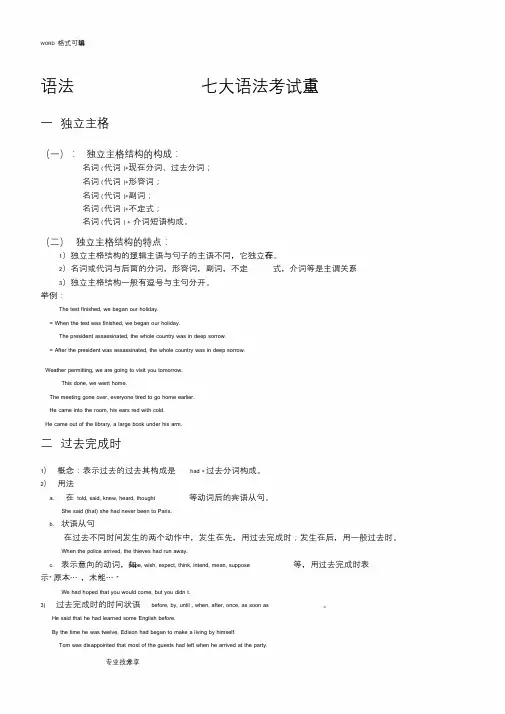
语法七大语法考试重点一独立主格(一):独立主格结构的构成:名词( 代词)+现在分词、过去分词;名词( 代词)+形容词;名词( 代词)+副词;名词( 代词)+不定式;名词( 代词) + 介词短语构成。
(二)独立主格结构的特点:1)独立主格结构的逻辑主语与句子的主语不同,它独立存在。
2)名词或代词与后面的分词,形容词,副词,不定式,介词等是主谓关系。
3)独立主格结构一般有逗号与主句分开。
举例:The test finished, we began our holiday.= When the test was finished, we began our holiday.The president assassinated, the whole country was in deep sorrow.= After the president was assassinated, the whole country was in deep sorrow.Weather permitting, we are going to visit you tomorrow.This done, we went home.The meeting gone over, everyone tired to go home earlier.He came into the room, his ears red with cold.He came out of the library, a large book under his arm.二过去完成时1)概念:表示过去的过去其构成是had + 过去分词构成。
2)用法a. 在told, said, knew, heard, thought 等动词后的宾语从句。
She said (that) she had never been to Paris.b. 状语从句在过去不同时间发生的两个动作中,发生在先,用过去完成时;发生在后,用一般过去时。
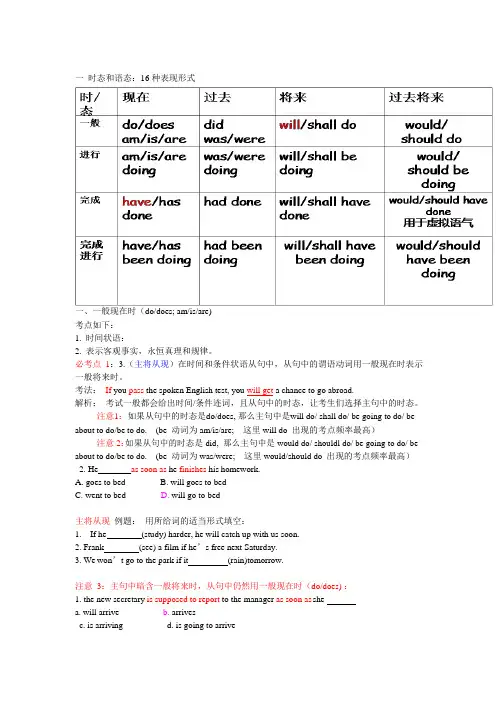
一时态和语态:16 种表现形式一、一般现在时(do/does; am/is/are)考点如下:1.时间状语:2.表示客观事实,永恒真理和规律。
必考点1:3.(主将从现)在时间和条件状语从句中,从句中的谓语动词用一般现在时表示一般将来时。
考法:If you pass the spoken English test, you will get a chance to go abroad.解析:考试一般都会给出时间/条件连词,且从句中的时态,让考生们选择主句中的时态。
注意1:如果从句中的时态是do/does, 那么主句中是will do/ shall do/ be going to do/ be about to do/be to do. (be 动词为am/is/are; 这里will do 出现的考点频率最高)注意2:如果从句中的时态是did,那么主句中是would do/shouldl do/be going to do/be about to do/be to do. (be 动词为was/were; 这里would/should do 出现的考点频率最高)2.He as soon as he finishes his homework.A. goes to bedB. will goes to bedC. went to bedD. will go to bed主将从现例题:用所给词的适当形式填空:1.If he (study) harder, he will catch up with us soon.2.Frank (see) a film if he’s free next Saturday.3.We won’t go to the park if it (rain)tomorrow.注意3:主句中暗含一般将来时,从句中仍然用一般现在时(do/does) :1.the new secretary is supposed to report to the manager as soon as shea.will arriveb. arrivesc. is arrivingd. is going to arrive2.---can I join your club, Dad?---you can when you a bit older.a.getb. will getc. are gettingd. will have get3.remember to send me a photo of your son next time you to me.a.writeb. will writec. are writingd. would write4.If Mr. Smith back, please let me know.A. will comeB. comesC. cameD. had come必考点2:4. the more..., the more...句型完整句型:The +形容词/副词的比较级+(名词)+主语+谓语,the +形容词/副词的比较级+ (名词)+主语+谓语.Eg: The more books he reads, the happier he is.12 年真题:18 题she said, she got.A.The more the more excitedB.More excitedC.Much the more excitedD.The much excited翻译练习题:1.他越忙就越高兴。
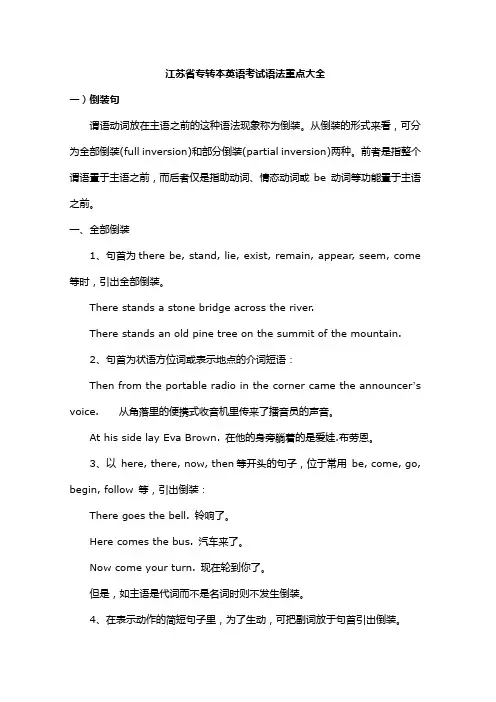
江苏省专转本英语考试语法重点大全一)倒装句谓语动词放在主语之前的这种语法现象称为倒装。
从倒装的形式来看,可分为全部倒装(full inversion)和部分倒装(partial inversion)两种。
前者是指整个谓语置于主语之前,而后者仅是指助动词、情态动词或be 动词等功能置于主语之前。
一、全部倒装1、句首为there be, stand, lie, exist, remain, appear, seem, come 等时,引出全部倒装。
There stands a stone bridge across the river.There stands an old pine tree on the summit of the mountain.2、句首为状语方位词或表示地点的介词短语:Then from the portable radio in the corner came the announcer’s voice.从角落里的便携式收音机里传来了播音员的声音。
At his side lay Eva Brown. 在他的身旁躺着的是爱娃.布劳恩。
3、以here, there, now, then等开头的句子,位于常用be, come, go, begin, follow 等,引出倒装:There goes the bell. 铃响了。
Here comes the bus. 汽车来了。
Now come your turn. 现在轮到你了。
但是,如主语是代词而不是名词时则不发生倒装。
4、在表示动作的简短句子里,为了生动,可把副词放于句首引出倒装。
Out rushed the dog from the gate. 一条狗从大门里嗖地一声窜了出来。
Up went the rocket into the sky. 火箭嗖地一声飞上了天空。
但:Away they went.5、在表达祝愿的句子里:Long live the friendship between American and Chinese people! 中美人民的友谊万岁!May you succeed! 祝你成功!6、在强调表语时Worst of all were the humiliations. 最令人难以忍受的是羞辱。
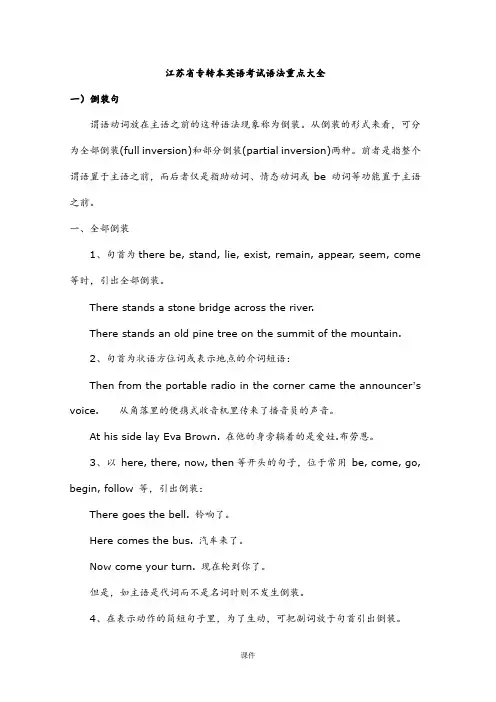
江苏省专转本英语考试语法重点大全一)倒装句谓语动词放在主语之前的这种语法现象称为倒装。
从倒装的形式来看,可分为全部倒装(full inversion)和部分倒装(partial inversion)两种。
前者是指整个谓语置于主语之前,而后者仅是指助动词、情态动词或be 动词等功能置于主语之前。
一、全部倒装1、句首为there be, stand, lie, exist, remain, appear, seem, come 等时,引出全部倒装。
There stands a stone bridge across the river.There stands an old pine tree on the summit of the mountain.2、句首为状语方位词或表示地点的介词短语:Then from the portable radio in the corner came the announcer’s voice.从角落里的便携式收音机里传来了播音员的声音。
At his side lay Eva Brown. 在他的身旁躺着的是爱娃.布劳恩。
3、以here, there, now, then等开头的句子,位于常用be, come, go, begin, follow 等,引出倒装:There goes the bell. 铃响了。
Here comes the bus. 汽车来了。
Now come your turn. 现在轮到你了。
但是,如主语是代词而不是名词时则不发生倒装。
4、在表示动作的简短句子里,为了生动,可把副词放于句首引出倒装。
Out rushed the dog from the gate. 一条狗从大门里嗖地一声窜了出来。
Up went the rocket into the sky. 火箭嗖地一声飞上了天空。
但:Away they went.5、在表达祝愿的句子里:Long live the friendship between American and Chinese people! 中美人民的友谊万岁!May you succeed! 祝你成功!6、在强调表语时Worst of all were the humiliations. 最令人难以忍受的是羞辱。
“专转本”考试分文科、理科,和日语这三大科目,英语是文理两个科目中的必考科目,在总分400分中占有150分的分值,其重要性不言而喻。
考纲大致内容如下考试内容:专转本考试包括五个部分:阅读理解、词语用法与语法结构、完形填空、翻译、作文。
试卷分为第Ⅰ卷(客观题)和第Ⅱ卷(主观题)两部分。
两卷满分150分。
考试时间为120分钟。
第Ⅰ卷(客观题):(100分)第一部分:阅读理解(PartⅠ:ReadingComprehension)第二部分:词语用法和语法结构(PartⅡ:VocabularyandStructure)第三部分:完形填空(PartⅢ:Cloze)第Ⅱ卷(主观题):(50分)第四部分:翻译(PartⅣ:Translation)第五部分:写作(PartⅤ:Writing)第一部分:阅读理解(PartⅠ:ReadingComprehension):(共20题,每小题2分,共40分) 要求考生阅读4篇短文,每篇阅读量不超过300词。
每篇短文后有5个问题,考生应根据文章内容从每题四个选择项中选出一个最佳答案。
选材的原则是:1、题材广泛,可以包括人物传记、社会、文化、日常知识、科普常识等,但是所涉及的背景知识应能为学生所理解;2、体裁多样,可以包括叙述文、说明文、议论文等;3、文章的语言难度中等,无法猜测而又影响理解的关键词会用汉语注明词义。
阅读理解部分主要测试下述能力:1、掌握所读材料的主旨和大意;2、了解说明主旨和大意的事实和细节;3、既理解字面的意思,也能根据所读材料进行一定的判断和推论;4、既理解个别句子的意义,也理解上下文的逻辑关系。
阅读理解部分的目的是测试学生通过阅读获取信息的能力,既要求准确,也要求有一定速度。
第二部分:词语用法和语法结构(PartⅡ:VocabularyandStructure):(共40题,每小题1分,共40分)题目为词和短语的用法和语法结构。
要求考生从每题四个选择项中选出一个最佳答案。
专升本英语语法知识点归纳专升本英语语法知识点归纳在专升本英语考试中,语法知识点是必考内容。
本文将为大家梳理常见的英语语法知识点,帮助大家更好地掌握英语语法,提高考试成绩。
一、时态时态是英语语法中非常重要的一个部分,主要涉及过去、现在和未来的时间表达。
以下是常见的时态及其用法:1、现在完成时:表示过去发生的动作对现在造成影响或结果。
例如:I have finished my homework.(我已经完成了我的作业。
)2、现在进行时:表示正在进行的动作。
例如:They are playing soccer.(他们正在踢足球。
)3、一般现在时:表示通常性、规律性发生的动作或状态。
例如:She goes to school every day.(她每天上学。
)4、一般过去时:表示过去的动作或状态。
例如:He lived in New York for three years.(他在纽约住了三年。
)5、一般将来时:表示将来发生的动作或状态。
例如:We will meet at the airport tomorrow.(我们明天将在机场见面。
)二、语态语态表示动词的形式,表明动作的执行者和承受者。
以下是常见的语态及其用法:1、主动语态:表示主语是动作的执行者。
例如:The dog bit the cat.(狗咬了猫。
)2、被动语态:表示主语是动作的承受者。
例如:The cat was bit by the dog.(猫被狗咬了。
)三、虚拟语气虚拟语气是一种特殊的语气,表示假设、猜测、愿望或建议。
以下是常见的虚拟语气及其用法:1、与现在事实相反的虚拟语气:使用过去时形式,表示与现在事实相反的假设。
例如:If I had a million dollars, I would buy a house.(如果我有一百万美元,我会买一栋房子。
)2、与过去事实相反的虚拟语气:使用过去完成时形式,表示与过去事实相反的假设。
专升本语法知识汇总专升本英语语法一:主谓一致一、单数名词作主语时的主谓一致1、集合名词与谓语动词的一致(1)集合名词作主语,如果表示整体概念,谓语动词用单数形式;如表示成员则用复数。
常见的这部分名词有:army,audience,class,club,committee,company,crowd,family,group,government,organization,party,personnel,public,staff,team,union,crew等。
注意:若以上集合名词表示组成该集合体的分散个体时,与其对应的人称代词也应该使用they,them或their。
(2)有些集合名词,如cattle,folk,people,police,poultry(家禽)等作主语,总是跟复数动词形式。
(3)有些表示某类别的总称的集合名词,如machinery(机械),clothing (衣服),luggage(行李),furniture(家具),equipment(设备),jewelry(珠宝)等作主语时,谓语动词常用单数。
2、单复数同形的名词与谓语动词的一致单复数同形的名词作主语,要根据上下文以及修饰这些词的词来确定其谓语形式。
常见的这部分名v词有aircraft,crossroads,deer,fish,headquarters, means,series,sheep,species,works等。
注意:fishes表示“各种各样的鱼”.3、表示成双成套的名词,如trousers,shoes,glasses,compasses等作主语时,谓语动词用复数。
二、复数名词作主语时的主谓一致1、以“s”结尾的书刊名、国名、组织名、游戏名、运动名作主语时,谓语动词通常用单数形式.2、表示群岛、瀑布、山脉等以“s”结尾的专有名词作主语时,谓语动词往往用复数。
3、以“ies"结尾的名词指一门学科时,常用单数谓语动词形式。
江苏专转本英语语法总结与练习形容词、副词比较级一、等比句句型下面这种句型主要表示人或物的性质、特征等方面有某些近似或相等:主语+谓语+as+形容词/副词+as+比较对象We have accomplished as much in the past three years as would have been taken ten years in the past.句子中两个as作用不同, 前一个as是副词, 含“如此”的意思; 后一个as是连词, 表示“比”或“如同”的意义。
下面这种句型的意思是“不比…多”或“不少于…”:主语+谓语+no more/less+形容词/副词比较级+than+被比对象是表达“相等”或“近似”的一种说法。
例如:She is no less diligent than her class mates.二、比较级句型比较级句型用于表示两个人或事物之间的差别。
它包括两个方面: 一是优等比较, 即“甲胜于乙”; 一是次等比较, 即“甲不及乙”。
主+谓语+形容词/副词比较级+(名词)+被比对象或: 主语+谓语+more/less+形容词/副词+than+被比对象Facts speak louder than eloquence.The new edition of the dictionary is more expensive than the old one.“否定的同等级较”也用于表示两个人或事物之间的差别。
例如: John doesn't work so hard as Henry.[提示]在英语中习惯上修饰比较级的副词不多,主要有much,far,even,still表示“…得多”和“更…”的意思。
三、最高级句型最高级句型用于表示某一事物在一定范围内最突出或某一动作达到最高程度的句子。
一般要有一个表示范围的词组。
…the+形容词/副词最高级+(名词)+范围词1. Jane is the tallest girl in the department of public relations.2. Of all the students, Beth works hardest.注: 引导范围的介词, 如果为同一范畴用of, 如例2; 否则用in, 如例1。
江苏省专转本英语考试语法重点大全一)倒装句谓语动词放在主语之前的这种语法现象称为倒装。
从倒装的形式来看,可分为全部倒装(full inversion)和部分倒装(partial inversion)两种。
前者是指整个谓语置于主语之前,而后者仅是指助动词、情态动词或be 动词等功能置于主语之前。
一、全部倒装1、句首为there be, stand, lie, exist, remain, appear, seem, come 等时,引出全部倒装。
There stands a stone bridge across the river.There stands an old pine tree on the summit of the mountain.2、句首为状语方位词或表示地点的介词短语:Then from the portable radio in the corner came the announcer’s voice.从角落里的便携式收音机里传来了播音员的声音。
At his side lay Eva Brown. 在他的身旁躺着的是爱娃.布劳恩。
3、以here, there, now, then等开头的句子,位于常用be, come, go, begin, follow 等,引出倒装:There goes the bell. 铃响了。
Here comes the bus. 汽车来了。
Now come your turn. 现在轮到你了。
但是,如主语是代词而不是名词时则不发生倒装。
4、在表示动作的简短句子里,为了生动,可把副词放于句首引出倒装。
Out rushed the dog from the gate. 一条狗从大门里嗖地一声窜了出来。
Up went the rocket into the sky. 火箭嗖地一声飞上了天空。
但:Away they went.5、在表达祝愿的句子里:Long live the friendship between American and Chinese people! 中美人民的友谊万岁!May you succeed! 祝你成功!6、在强调表语时Worst of all were the humiliations. 最令人难以忍受的是羞辱。
Such is the case. 情况就是这样。
二、部分倒装1、省略if 的虚拟条件句中Had I known what was going to happen,I would never have left her alone.如果我当时知道可能发生的事的话,我就不会撇下她一个人在那里了。
Were there no air or water, there would be no life in the world. 没有空气和水,世界上就不会有生命。
2、在以so(肯定)和neither, nor(否定)的句子中He didn’t fear new ideas, nor did he fear the future. 他不怕新想法,也不怕未来。
I’ve had some good ideas, so have other men. 我有些新的想法,别人也会有啊。
Distrust can be contagious, but so can trust. 不信任有传染力,同样信任也具有传染力。
3、当句首状语为否定词或带有否定意义的词语时,如never, little, often, not only, not until, hardly, scarcely, seldom, no sooner ... than …, in no way, at no time, under no circumstances, by no means, in no case,采用部分倒装。
Little does he care about money. 他很少关心钱。
Not until recently did I know what he had done. 直到最近我才知道他所做的事。
4、句首状语由only+副词,only+介词短语,only+状语分词时Only yesterday did he find out that his watch was missing. 直到昨天他才发现表丢了。
Only in our country can science serve the interests of the people. 只有在我们国家科学才能服务于人民的利益。
5、在强调宾语时Still greater contributions should we make to our socialist construction. 我们应该为社会主义建设做出更大的贡献。
Useful chemical fertilizer can we make from the waste liquid. 从废弃液体中我们能提取有用的化学肥料。
二)非谓语动词种类及句法功能(一)概述:在英语中,不作句子谓语,但仍具有除谓语外其他语法功能的动词,叫做非谓语动词。
非谓语动词有动词不定式(the Infinitive);动名词(the Gerund);现在分词(the Present Participle);过去分词(the Past Participle)。
(二)非谓语动词的句法功能1)逻辑主语为了强调是谁发出的一个动作,我们往往要有主语来明确表现。
由于非谓语动词在句中不做谓语,所以强调谁发出的动作就不明显。
但它又有动词的某些特征,在这种情况下,就有了其逻辑上的主谓关系。
在英语中,非谓语动词的逻辑主语各有其不同的表现方式,也是常考的一个语法项目,尤其是动名词和分词的逻辑主语。
现在来简要分析一下在不定式、动名词和分词中的逻辑主语。
①不定式的逻辑主语是同过介词of 和for来体现的。
这两个介词使用的区别是:当表语是表示主语的性质或特征时(如:good, nice, wise, generous, foolish, clever, silly, wrong, stupid, careless, considerate, impolite, naughty等等),我们使用of; 其它的使用for。
请看例句:It is unwise of them to turn down the proposal. 他们拒绝这个建议很不明智。
It is generous of you to stay us for the night. 难为你这么慷慨留我们过夜。
It is a great honor for us to attend this rally. 我们很荣幸参加这个大会。
It is very dangerous for children to swim in the reservoir. 孩子们在水库里游泳很危险。
②动名词的逻辑主语是在动名词前用名词或代词来表现的。
在句首时一般要使用所有格,在句中一般使用其通格。
例如:Mary’s grunting continuously annoyed her husband, and her mother’s staying with them was the last straw. 玛丽的不断唠叨已经使她丈夫很烦,她母亲来和他们一块住更使他们的关系雪上加霜。
Xiao Li’s being late for school upset the teacher. 小李的迟到让老师很恼火。
Our sole worry is (you) your relying on yourself too much. 我们唯一的担心是你这个人太相信自己了。
They insisted (Xiao Wang) Xiao Wang’s going with them together. 他们坚持要小王和他们一块走。
③分词的逻辑主语有两种:一是悬垂分词的逻辑主语,其二是独立主格结构的逻辑主语。
在悬垂结构中,分词的逻辑主语就是主句的主语,如果两者不能构成逻辑上的一致关系则该句结构是错误的.如:Seen from the space, the earth look like a blue ball. 从太空看起来,地球像个蓝色的球体。
这个悬垂结构seen from the space = when the earth is seen, …Laughing and chatting, the pupils left school for home. 孩子们说说笑笑回家去了。
同上述结构一样,Laughing and chatting = the pupils were laughing and chatting, …独立主格结构与悬垂结构不同的是独立结构有自己的主语。
这个主语有名词或代词通格来表示,放于分词之前,与分词形成逻辑上的主谓关系。
例如:So many comrades being absent, the meeting had to be put off. 这么多同志都缺席了,所以会议只得延期。
We all went home, he remaining behind. 我们都回家了,只有他留在后面。
Weather permitting, we will go for an outing next week. 如果天气许可,我们下周去郊游。
The class (being) over, the teacher dismissed the students. 下课了,老师把学生打发走了。
The job done, we all went home. 工作完成之后,我们就都回家去了。
With the tree grown tall, we get more shade. 随着树的不断长高,树荫也越来越浓密了。
Everything taken into consideration, this plan seems to be more feasible.把一切考虑在内,这个计划看起来可行。
They worked throughout the night with the lamp lighted. 他们挑灯夜战。
二、非谓语动词考查点1) 谓语动词与非谓语动词的判断对谓语动词与非谓语动词区别的考查主要集中在独立主格结构,如:1. All flights ___ because of the snowstorm, many passengers could do nothing but take the train.A. had been canceledB. have been canceledC. were canceledD. having been canceled【答案】D。